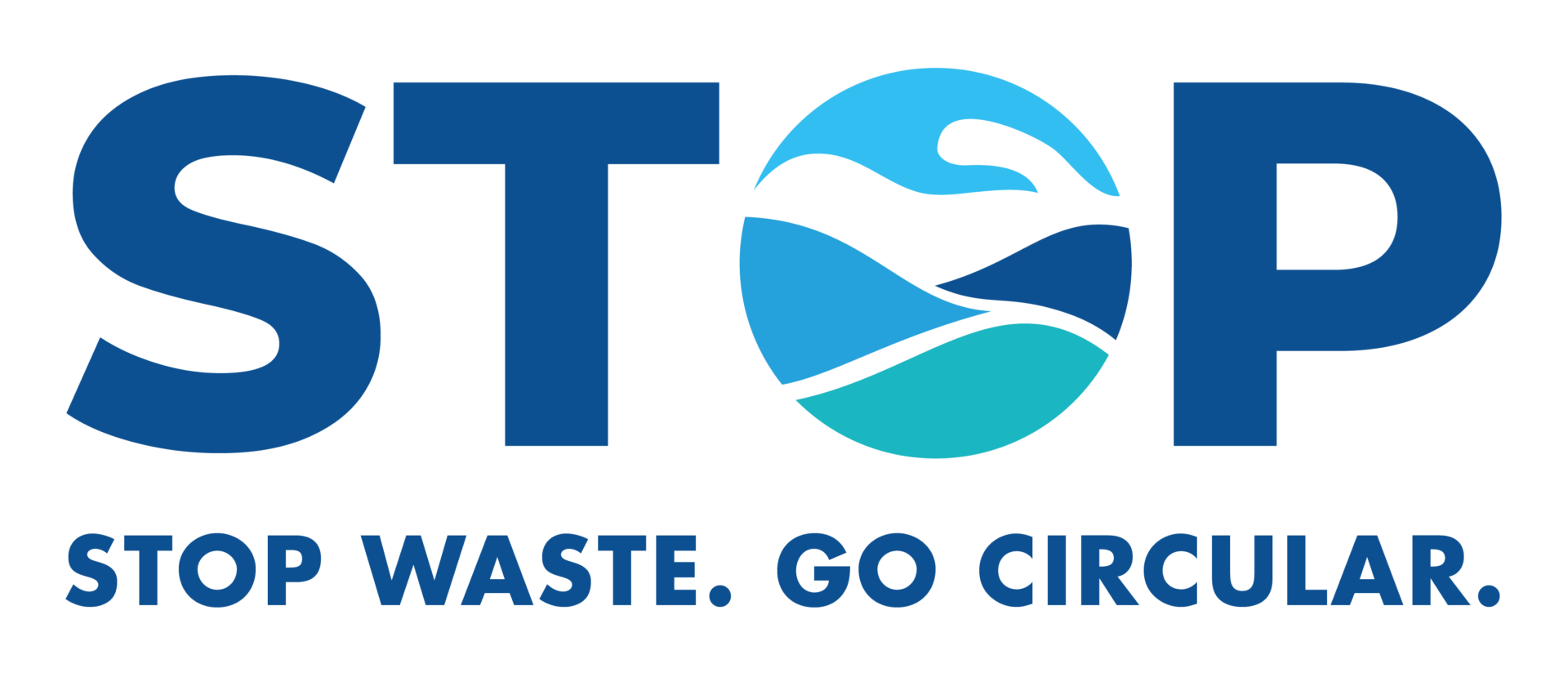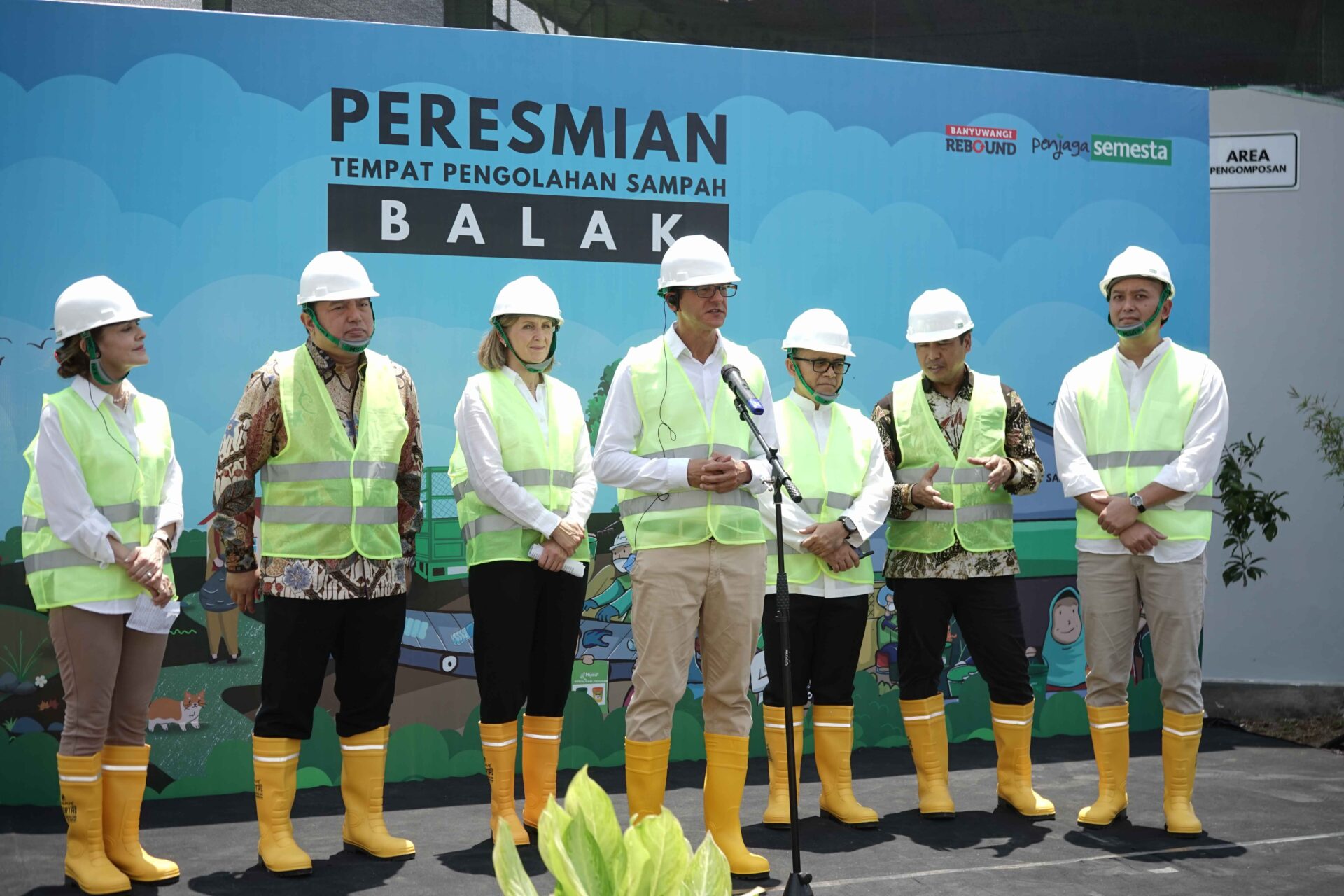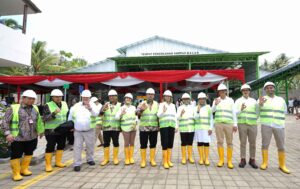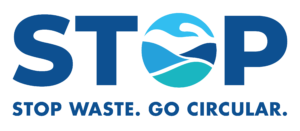From left to right: Ministry staffs, Anton Wolfsberger-Vice President Global Packaging & Circular Economy at Borouge, Rofi Alhanif-Assistant Deputy for Waste and Waste Management at Coordinating Ministry of Maritime and Investment, Laura Gonzales-Legal Resident Officer at USAID, Tomsi Tohir-Inspectorate General of the Ministry of Home Affairs, Rut Kruger Giverin-Norway Ambassador for Indonesia, Abdullah Azwar Anas-Minister for Empowerment of State Apparatus for Bureaucratic Reform, Ipuk Fiestiandani-Banyuwangi Regent, Markus Horcher-Director Sustainability & Public Affairs at Borealis, Anthony Berthold-Senior Advisor at Borealis, Widharmika Agung-Partner at Systemiq.
New Material Recovery Facility Opened in Banyuwangi Under Project STOP’s Expansion Programme
- Inauguration of new material recovery facility (MRF) in Songgon Municipality, Banyuwangi, East Java represents a key milestone towards building Indonesia’s first Regency-led circular waste management system as part of the Project STOP Banyuwangi Hijau expansion plan.
- One of the largest of its kind in Indonesia to date, the new MRF will manage waste collection and sortation from households in the region, including materials to be recycled, with a daily capacity to process up to 84 tonnes of waste.
- The MRF will collect all waste, including 3,300 tonnes of plastic waste per year, at full scale by 2025.
Banyuwangi, East Java, Indonesia, 18 September 2023— On Saturday, 16 September 2023, Project STOP and Banyuwangi Regent, Ipuk Fiestiandani, inaugurated one of Indonesia’s largest Material Recovery Facilities (MRF) in Songgon Municipality. Built in collaboration with the regional government of Banyuwangi, the facility is a significant milestone towards establishing Indonesia’s premier regency-led circular waste management system.
Key highlights:
- The MRF will manage waste collection and sortation as well as materials to be recycled from households in the region.
- Its daily processing capacity is up to 84 tonnes of waste.
- Anticipated to create approximately 200 jobs by 2025 and service over 250,000 residents.
- By 2025, the MRF aims to collect annually 23,000 tonnes of waste, including 3,300 tonnes of plastic.
Co-founded by Borealis and Systemiq, with broad support from National and Regional Governments, international institutions, academia and private sector, Project STOP Banyuwangi focuses on delivering measurable impact on the ground. Since its inception in 2017, it has steadily extended across the entire Banyuwangi Regency. The new MRF is part of its Banyuwangi Hijau expansion plan, aiming to positively impact the lives of up to 2 million individuals, across all Project STOP city and regional partnerships, create 1,000 full-time jobs and annually collect 230,000 tonnes of waste, including 25,000 tonnes of plastic.
“Plastic leakage to sea, land and air can be prevented by working closely with all stakeholders. Through the Project STOP Banyuwangi initiative, we work hand-in-hand to make tangible improvements to the health of the local environment and people living in Banyuwangi,” said Ipuk Fiestiandani, Banyuwangi Regent. “We hope this infrastructure can establish the implementation of a circular waste management system and become a benchmark to other regions in Indonesia.”
For the MRF’s construction, the Banyuwangi Regency Government allocated more than 1.5 hectares of land in the first phase of the Project in Banyuwangi. The circular waste system is designed to support the implementation of the Banyuwangi government’s Solid Waste Master Plan, co-developed by Banyuwangi Agencies, the Clean Oceans through Clean Communities (CLOCC) Program and Project STOP.
“Since we founded Project STOP together with Systemiq in 2017, we established waste management systems in Muncar, Pasuruan and Jembrana as first phase. Based on the learnings done in the first three cities, we will now expand the reach of Project STOP to the Banyuwangi region. Beyond that, we hope that Project STOP serves as inspiration and blueprint for other projects to accelerate the establishment of a circular economy and to avoid waste leakage into the environment,” commented Thomas Gangl, Borealis CEO.
“This second Project STOP Program in Banyuwangi underscores our enduring partnership with the Regency and other local government agencies, with increased impact and benefits for the local environment and population. We intend this to be a beacon for Regencies across the country and thank our funders and partners for their ongoing commitment,” said Ben Dixon, Head of Materials and Circular Economy at Systemiq.
The state-of-the-art MRF is equipped to handle both organic and inorganic waste. Organic waste will be processed into compost, while inorganic waste will be sorted and transferred to the recycling industry.
Project STOP Banyuwangi’s achievements can be largely attributed to its successful collaborations and close partnerships with various Indonesian government bodies, such as the Coordinating Ministry for Maritime and Investment Affairs (CMMAI), the National Ministry of Environment and Forestry (MoEF), the Banyuwangi regency government and Project STOP Strategic Partners including the Norwegian Government, Accenture, Borouge, USAID and Partnering for Green Growth and the Global Goals (P4G).
For more information on Project STOP:
Website: www.stopoceanplastics.com
Find us online: Twitter | YouTube | LinkedIn | Instagram
About Project STOP
Launched in 2017 by Borealis and Systemiq, Project STOP (STop Ocean Plastics) works hand-in-hand with city governments to create effective circular waste management systems in high-need areas of Southeast Asia. The initiative supports cities with technical expertise to achieve zero-leakage of waste, increase recycling, build economically sustainable programs, creating new jobs and reducing the harmful impact of mismanaged waste on public health, tourism, and fisheries. The first city partnership was established in 2017 in the municipality of Muncar, East Java, followed by others in Pasuruan, East Java and Jembrana, Bali. In February 2022, Project STOP Muncar was handed over to the local government and community. In March 2023 Project STOP Pasuruan was handed over to the government and community and in June 2023 Project STOP Jembrana was fully handed over to the local regency government.
Now the programme expands to the Banyuwangi regency—combining a regency level waste system model with a material aggregator into a circular waste and recycling solution that can transform waste economics.
For more information on Project STOP:
Website: www.stopoceanplastics.com
Find us online: Twitter | YouTube | LinkedIn | Instagram
About Borealis
Borealis is one of the world’s leading providers of advanced and sustainable polyolefin solutions. In Europe, Borealis is also an innovative leader in polyolefins recycling and a major producer of base chemicals. We leverage our polymer expertise and decades of experience to offer value-adding, innovative and circular material solutions for key industries such as consumer products, energy, healthcare, infrastructure and mobility.
With operations in over 120 countries and head offices in Vienna, Austria, Borealis employs around 6,000 people. In 2022, we generated a net profit of EUR 2.1 billion. OMV, the Austria-based international oil and gas company, owns 75% of our shares. The Abu Dhabi National Oil Company (ADNOC), based in the United Arab Emirates (UAE), owns the remaining 25%.
In re-inventing essentials for sustainable living, we build on our commitment to safety, our people, innovation and technology, and performance excellence. We are accelerating the transformation to a circular economy of polyolefins and expanding our geographical footprint to better serve our customers around the globe. Our operations are augmented by two important joint ventures: Borouge (with ADNOC, headquartered in the UAE); and Baystar™ (with TotalEnergies, based in the US).
www.borealisgroup.com | www.borealiseverminds.com
About Systemiq
Systemiq was founded in 2016 to drive the achievement of the Paris Agreement and the UN Sustainable Development Goals by transforming markets and business models in five key systems: nature and food, materials and circularity, energy, urban areas and sustainable finance. A certified B-Corp, Systemiq combines strategic advisory with high-impact on-the-ground work, and partners with business, finance, policy makers and civil society to deliver systems change. Systemiq has offices in Brazil, France, Indonesia, the Netherlands and the UK. Find out more at www.systemiq.earth.




